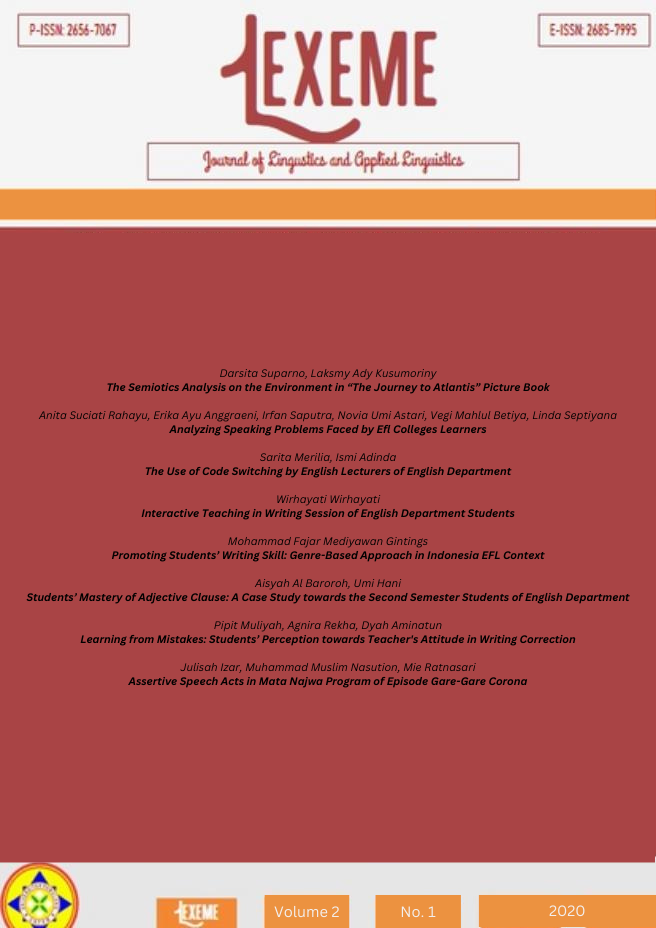Promoting Students’ Writing Skill: Genre-Based Approach in Indonesia EFL Context
DOI:
https://doi.org/10.32493/ljlal.v2i1.6993Keywords:
Genre-Based Approach, EFL Context, Students’ Writing SkillAbstract
This paper aimed to critically examine the effectiveness of Genre-Based Approach (GBA) to teaching writing in EFL context of Indonesia. Although several studies have discussed the effectiveness of GBA in teaching writing, those studies put emphasize how GBA focuses on genre or text types rather than the basic principles of GBA that aims for socially functioning language skills. This paper draws on the relevant literature to investigates how GBA suits the teaching of writing in EFL context of Indonesia. Moreover, the discussion focuses on the benefits of GBA which mainly derived from five key principles of Genre proposed by Hyland (2007). Through the exploration of existing empirical studies, this paper found that GBA offer three main benefits in teaching writing under the EFL context. These benefits are: (1) the offer of practical writing skill; (2) the build of students’ confidence in English writing; and (3) stimulation on students’ critical thinking as part of their English literacy. Nevertheless, the benefits of GBA in teaching writing could only be attained if teachers implement GBA according to its full-fledged teaching and learning cycles.References
Cornelius, S., & Cotsworth, B. (2015). Genre Analysis and Genre-based Approaches to EFL Writing: A Critical Analysis. 15-21. Retrieved September 20, 2016, from https://www.kansai-u.ac.jp de Oliviera, L. C., & Lan, S.-W. (2014). Writing science in an upper elementary classroom: a genre-based approach to teaching English language learners. Journal of Second Language Writing, 25, 23-39. doi:10.1016/j.jslw.2014.05.001 Depdiknas. (2003). Kompetensi Dasar Mata Pelajaran Bahasa Inggris SMA & MA. Jakarta: Balitbang Depdiknas. Emilia, E. (2011). Teaching Academic Writing: A Critical Genre-Based Approach in an EFL Context. Frankfurt: Lambert Academic Publishing. Hyland, K. (2007). Genre pedagogy: Language, literacy and L2 writing instruction. Journal of Second Language Writing, 148-164. Hyland, K. (2009). Teaching and Researching Writing. Harlow: Pearson Education Limited. Hyon, S. (1996). Genre in Three Tradition: Implications for ESL. TESOL Quarterly, 30, 693-722. Kim, M. (2006). Genre-Based approach to teaching writing. TESOL Working Paper Series 4 (2), 33-39. Retrieved September 20, 2016, from http://www.hpu.edu Kim, Y., & Kim, J. (2005). Teaching Korean University Writing Class: Balancing the Process and the Genre Approach. ASIAN EFL Journal, 7(2), 1-15. Retrieved September 20, 2016, from http://www.asian-efl-journal.com Martin, J. R., & Rose, D. (2007). Genre Relations. London: Equinox Publishing. Myskow, G., & Gordon, K. (2010). A Focus on Purpose: Using Genre approach in an EFL writing class. ELT Journal, 64(3), 283-292. doi:doi:10.1093/elt/ccp057 Wingate, U. (2012). Using academic literacies and genre-based models for academic writing instruction: a 'literacy' journey. Journal of English for academic purposes, 11, 26-37. doi:10.1016/j.jeap.2011.11.006







